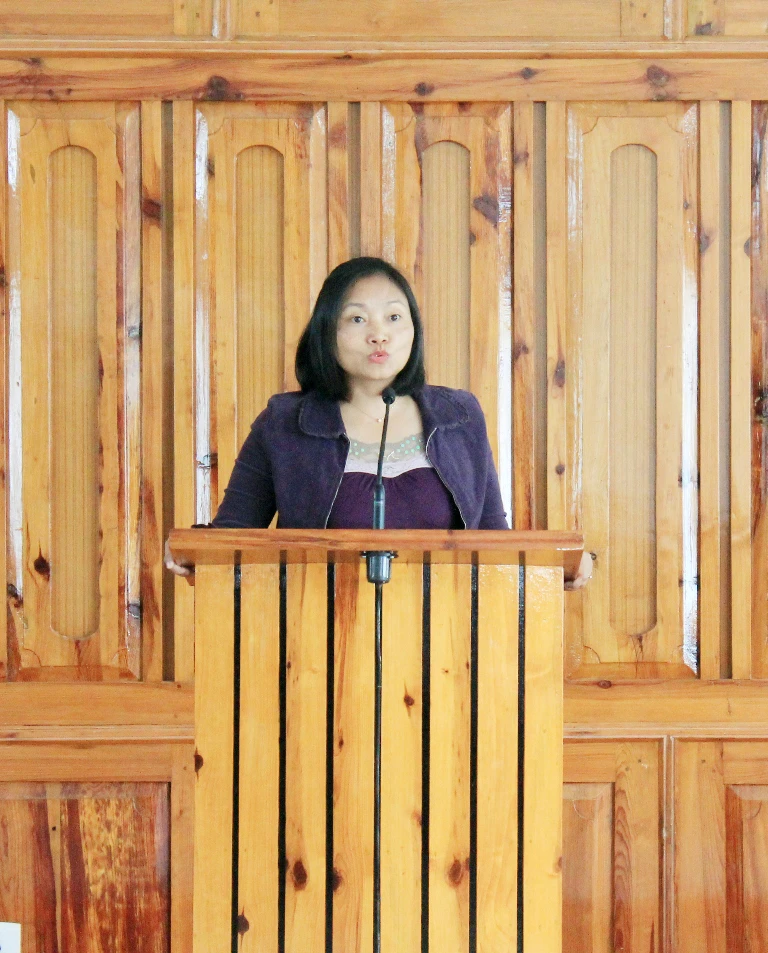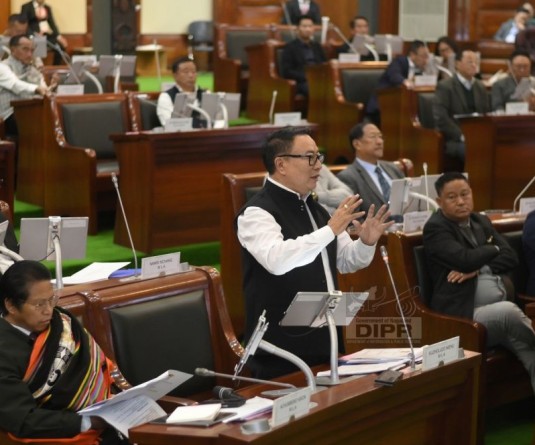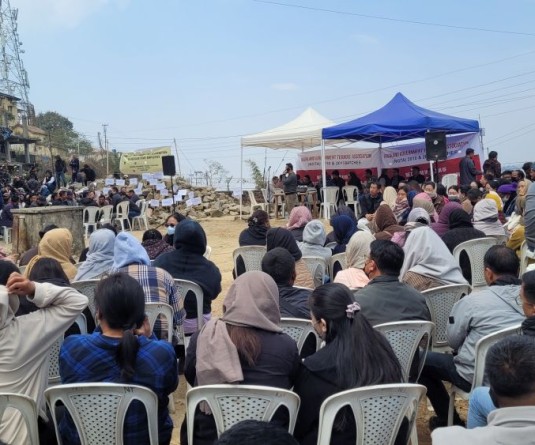Elias T Lotha
Morung Express News
Kohima | October 4
The surge of tribalism in Nagaland has become a matter of serious concern. There are many negative effects of tribalism to the society, and even to the Church. Besides, tribalism promotes bad governance and lack of accountability and has become a major obstacle to socio-economic development.
In this backdrop, the 6th Morung Lecture focusing on the ‘Role of Religion in promoting Inter-Tribe Harmony among Nagas’ was held at Jubilee Memorial Centre (JMC-KABA), Lerie Colony, Kohima on Tuesday.
Speakers at the Lecture were Elias T Lotha, President, Catholic Association of Nagaland (CAN), Dr. Eyingbeni Hümtsoe-Nienu, Senior Lecture, Clark Theological College and Rev. Dr. Zelhuo Keyho, General Secretary, Nagaland Baptist Church Council (NBCC).
Respect pluralism not singularism for social harmony
In his discourse, Elias T. Lotha, President, CAN, questioned the position of the Naga Christian churches in Nagaland, where there are numerous faith-based organizations that do not truly converge in the translation of Christian beliefs.
“We have Church organizations of this tribe, that tribe but never a fellowship to believe and worship together without our tribe color. Consciously or otherwise, we are bracketing each other into tribe pockets and not as Christians,” said Lotha who outlined that respect for “pluralism rather than singularism” by inculcating “universality” can act as a threshold for social harmony.
Lotha was of the view that the most evocative philosophy is victory and domination in the context of Naga tribal ethnicity, which therefore culminates in the form of tribalism and grouping systems alien to Christian values. Opining that the social front presents a gloomier picture with the Naga society fractured into tribal divides such as TPO, ENPO, CNTC, NTC, Naga Hoho, UNC etc, Lotha asserted, “All these, and more, inform us that we truly and urgently need to convert from a conformist milieu to transformative and rewarding mission for positively impacting the society through practice of Christian values.”
To help transform Naga tribes in ushering harmony, Lotha shared the approach of the Catholic Church, which is -Dignity of the human person, promotion of the family, and working for the common good. The common good, Lotha emphasized, is not simply what people happen to want, but what would be authentically good for people, the social conditions that enable human flourishing.
Further, Lotha pointed out that the journey of the Church does not end in establishing inter tribe harmony alone. “Harmony amongst tribes is the beginning of a new journey for much need to be pursued and accomplished as members of the Naga tribes and as members of the Christian community,” ended Elias T Lotha.
Transcend peace from large-scale practice to personal conversation
Speaking on the origin of peace through a Biblical perspective, Eyingbeni Hümtsoe-Nienu, Senior Lecturer, Clark Theological College, balanced the multidimensional meaning of peace in the Bible where the Old Testament emphasizes on ‘Shalom’ as Peace, which is about wholeness and fullness while the New Testament translates peace in terms of righteousness and justice. These, according to Nienu, are two sides of the same coin.

While there are notable contributions of Christian based peace work in Nagaland such as NBCC-Peace Affairs, FNR, Peace Channel, CCPRA, Nienu felt that the approach to peace needs to transcend from large scale/mass oriented practice to personal conversation, from top-level discussion to grassroots participation; from intellectual discourses to down-to-earth/practical measures, from the political to the holistic and from the male-centered to the gender inclusive in composition and perspective.
“Christian Peace efforts should not be portrayed merely as a glamorous affair characterized by closed-door intellectual meetings, constituted by high profile persons, and conducted in expensive locations to discuss political problems and solutions,” viewed Nienu. In this, she recommended for the formulation of a solid theological bases for engagement in inter/intra tribe peace works-“People in the community and grassroots level should be taken into confidence. They live with the consequence of either peace or violence. Their stories and viewpoints are essential to building and keeping peace.”
Nienu also suggested for the institution of peace committees/departments under every Church association to promote, sustain and safeguard peaceful existence among Naga tribes, to establish peace committees in local churches to educate members on maintaining tribal unity and address issues related to peace and justice.
Church must promote conducive co-existence
Rev. Dr. Zelhou Keyho, General Secretary of Nagaland Baptist Church Council (NBCC) emphasized that the church must be involved in the reconstruction of society on Christian principles of love and forgiveness. Maintaining that the biblical Christian faith is not deeply rooted in majority of those who profess themselves Christian, he said the church is not free from the spirit of tribalism.
In this regard, he also laid out the road map, which the church must undertake, where he emphasized that the church must take her faith, and her teaching ministry seriously and not just be preaching “feel good gospel.” The church cannot lose the power of speaking for justice and righteousness living at all cost, he asserted.
The NBCC General Secretary further said the church must come strong on corruption and come clean of her corrupt practices that are not biblical, and also make positive influence to the society and not be influenced by the society by becoming part of the problem.
In the meantime, he highlighted that the church must teach the gospel, moral laws, moral responsibility and biblical ethics without compromise. He felt that purity and morality must not just become good principles and be kept in the closet but must be taught with all seriousness from the pulpit.
“The church must not play the game of withdrawal but it must avoid unholy alliances with unhealthy forces to run their agenda, whether it be the state or tribal organizations but stands above those elements and promote conducive co-existence,” he added.
The need for one Christian body
Participants comprising of intellectuals, church leaders, social and human rights activists, attending the lecture deliberated on different issues surrounding the topic. Questions relating to disharmony in the churches, the stance of church on women, or if there is a difference between tribal affinity and tribalism, among others, were raised.
On disharmony in the churches, the participants and the panelists felt the need for the revival of the Naga Christian Forum, which was once functional as one Christian body and comprised of members cutting across denominations.
On the stance of the church on women, Rev. Dr. Zelhou Keyho said when Christianity came, it took a deep root in our culture and unconsciously even that trend has been passed on, which, he added is very unfortunate. However, he strongly highlighted that the church must always continue to encourage leadership whether male or female based on their calling.
Dr. Eyingbeni Hümtsoe-Nienu, described tribal affinity as a natural thing but tribalism a nurtured thing, influenced by many factors. Supplementing this, Elias T. Lotha, said unlike tribal affinity, which comes naturally to us, tribalism is a voluntary act and is very negative in nature.
Can our church become the face saving mechanism?
In his concluding remarks, Editor of The Morung Express, Dr. Aküm Longchari highlighted assumptions drawn from the Lecture with queries- Are we mistaking harmony and unity for uniformity? Have Christian values failed or is it the frailty of humans that has failed us? Are we dwelling too much in the abstract and missing the point…? Longchari pointed out that the Naga understanding of Christianity is “very narrow but very concrete.”
Stating that the aspects of “shame” and “humiliation” have become rooted in the Naga understanding of addressing problems, he asked “is it possible for our church to become the face saving mechanism?”
He informed that the present forms of dialogues are actually a “dialogue between monologues” where the parties involved are posturing their positions rather than finding common ground. He therefore emphasized on the need to reclaim genuine democratic dialogue where people engage and challenge each other in an informed manner. He said, “We may not have all the answers but it’s important for us to own the problems so that in the process of dialoguing, we will find solutions.”






